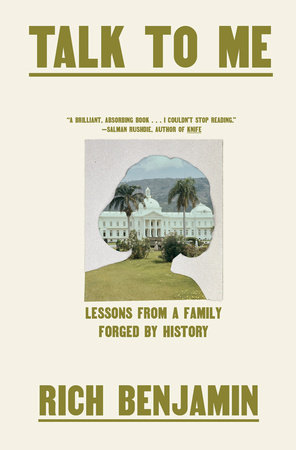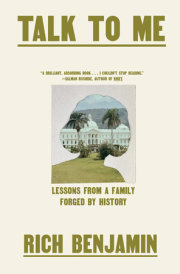Chapter 1
My mother carries many names. My whole life I have called her Mommy. She insisted on it, appalled by my friends who called their mothers by first name. But
Mommy suggests a maternal warmth my mother never had, and it imparts an infantilizing smallness on those who utter it. It would embarrass me in high school, college, and even now when my friends overhear me on the phone: “Okay, Mommy. I’m doing my best.” My sisters, middle-aged women, use the word
Mommy sometimes with a cutting sarcasm they don’t quite intend. “Would someone call that woman an Uber? Mommy got lost again.”
Her sisters called her Danny, especially when they needed something from her. It showed affection, but it also brought her down a peg or two. “Did you hear what Danny did?” an auntie would snicker, making my mother sound like some dumb teenager. But also: “Oh, Auntie Danny [flattery, flattery, flattery]!” a broke cousin would crow, angling for yet another in a lifetime of handouts. Danny is a name of approach, familiar, endearing, a versatile catchall for the many roles my mother plays to extended family.
Her friends and staff at the United Nations used to introduce her as Danielle Benjamin, which is also how she signed all her correspondence. It’s a posh sort of name, worn by the kind of person with more luxuries than problems. In my twenties, I would pick her up at the UN complex in Manhattan so we could go out to lunch. Danielle, beaming, would grab my hand and shove me toward her colleagues.
“This is my son Richard. He’s a professor. He’s come all the way from California—especially to see
me.” And her colleagues, UN officials, would say with excitement, “You’re the son of Danielle Benjamin?” I would smile, proud. That name made her formidable, a powerful, independent woman, even though she’d inherited it from two men, her father, Daniel, and her husband.
To Pops, our father, she was always “your mother.” “Your mother said so,” he’d explain as he denied we siblings something we wanted, putting on his helpless, remote face. He got to be light and easy by making his wife—“your mother”—a shrew. One Saturday afternoon sometime in the nineties Pops turned up with a brand-new SUV. My siblings and I circled the golden Lexus in the driveway, jumping up and down. Pops had bought it on a whim for thirty thousand dollars. Mommy screamed at him for hours, then wouldn’t speak to him for days. She was the one who had to bring things back down to planet Earth. It was her refugee mentality that kept us bathed, educated, fed. He got to gallivant the world and be the popular one. She had to make the tough choices. Those choices got us where we are today.
Just as her names stir a nest of contradiction, so too does her demeanor. Closed off and harsh in some instances, she is also a devoted humanitarian. Wherever I travel around the globe, strangers corner me, recite all the things that Danielle has done for them: bought braces for their daughter to straighten her teeth; shipped books to their broke, crowded school; slipped them money so they could flee their war-ravaged country. Never have I met anyone with the capacity to be so noxious one moment, so generous the next.
I never know which version of her will turn up, the damning judge or the empathic Samaritan. Years ago, I visited her at her independent senior–living community in suburban Maryland. We came upon her neighbor in the third-floor hallway, sprawled on the floor in front of her own door.
“I fell,” she cried.
“One second!” I said. “Let me help you up.” Her face brightened, but then we heard my mother bark:
“Don’t help her! Just leave her on the floor.”
“Excuse me?” said the old lady. Her face froze and her voice hard- ened on the question.
Mommy ignored her and turned to me. “When some granny falls, you’re not supposed to move them. Just call nine one one.”
“Please don’t call nine one one,” the woman croaked. “My son had to pick me up in the emergency room last week—then his wife threatened to put me in a nursing home.”
My mother looked down at her neighbor, her filmy blue eyes hopeful and pleading.
“C’mon. Just give me a little boost. Once I grab that doorknob, I can do the rest myself. Please?”
The lady did a small wave of her hand, jewels blinking from her wrinkled knuckles, as if to remind me how close she was to reaching her door from the floor.
“Don’t touch her!”
“Sorry.” I shrugged. I reached for my phone and called 911. I spoke slowly and cheerfully to the dispatcher, so as not to panic the woman.
For an awkward fifteen minutes, I made small talk with the woman between her pained whimpers, while my mother checked her email on her cell phone. As soon as the paramedics arrived, Mommy announced, “Great. Let’s go.”
Even as Danielle abandons you to your own devices, she won’t miss an opportunity to control you. So ingrained are her refugee tics, she will impose her anxiety on you and shatter your calm in an instant.
Years ago, on yet another visit, my mother and I got ready for bed in my Brooklyn apartment. She appeared to be in a jolly mood when she emerged from my bathroom, traces of her night cream pocking her cheeks.
“What time do we need to be up?” she asked as she settled into my bed.
“No specific time. Sleep in and we’ll have a leisurely morning before I head to work.”
The next day I woke to an amber flush of light shining on my face from the large living room windows. I took a deep breath, savoring the sensation of a beautiful mind, that rare, primordial morning clarity when my writer’s head is spacious. I rolled out of the sleeping bag and onto a yoga mat. Each long, slow breath lent a small bliss to the syncopated release of my muscles. After Ustrasana, a generous, heart-opening stretch, I sat on my off-white tufted couch, meditating, then rose, put on a kettle, and arranged my Japanese tea leaves into the infuser. I slowly poured the boiled water to steep the aromatic loose-leaf sencha and watched with well-versed patience, waiting for the leaves to release just the right sweet grassiness.
My mother vaulted out of my bedroom, eyes bulging, brow scrunched, mouth crimped.
“Wake up! You’re late! Hurry up!” she hollered. Her cheeks drilled down, compressing her mouth into a tight, ugly pucker. “What time is it?” she yelled, her eyes darting across the kitchen, searching for a clock. There was none. “You’re late!”
Seeing no reaction from me, she thrust her index finger in my face. “You’re going to lose your job!”
My chest tightened. “Am I late for work?” I wondered. My shoulders clenched. I checked my phone: It was barely eight. I wanted to slap her that instant. I could practically see my beautiful mind on the kitchen floor in a small pile of ashes.
And then a smile crept on my lips. My mother’s expression transported me directly to my childhood; she’d been screaming at me since I was a baby. I was certain my nervous system had been shot thanks to shouting sprees like this, growing up with her dramatics. She had a penchant for beginning every school day, every shopping outing, every vacation, in a frenzy, certain that the worst was about to ambush us. Staring at her now, I wanted to remind her of what I’d said the night before, that there would be no rushing this morning.
Instead I said nothing. I turned to my cup and wriggled the brew basket. The leaves had steeped too long; I knew that my tea would taste bitter.
To her chagrin, Mommy’s antics often boomerang back at her. I am more like her than either of us cares to admit. Her sensibilities—her outbursts, her aggressions—grate on me because they hold an unflattering mirror to my own, and I suspect my mother is often caught off guard, in turn, by how my impatience, my aloofness, lasers on her.
Once, walking down Sixth Avenue from Penn Station, I looked, midsentence, to my right: I’d been talking to no one. I swiveled and saw my mother many feet behind me. She was in her midseventies then, standing next to her small pull-along suitcase, panting.
“This thing,” she moaned. “Can you take it? My asthma is killing me.” She started exhaling some loud, dramatic breaths.
“C’mon,” I snapped. “Stop faking!”
Mommy did a double take. “It’s heavy.” I could see her eyes tear up.
“Next time don’t pack so many shoes. One pair. That’s all the sneakers one needs for a weekend.”
I looked her in the eyes for punctuation, turned around, and kept walking.
Another evening, she told me she had news. Doctors had found a precancerous lesion in her breast. She asked me to go to the hospital with her for the surgery. I eagerly volunteered to call her a car to get her to the operation on time. Nothing else. It took years for me to realize my misunderstanding, the cold idiocy of my reply. Mommy was seeking company and comfort through an unnerving ordeal, not transportation to an appointment. But it was a time in my life in which I genuinely believed that organizing her car service to the hospital covered my bases for being a good son.
As much as I hope to demonize this woman, I find that I can’t. I am but a photonegative of her. So, notably, it is not just the way we fight that bonds us, it’s the way we laugh.
Copyright © 2025 by Rich Benjamin. All rights reserved. No part of this excerpt may be reproduced or reprinted without permission in writing from the publisher.










